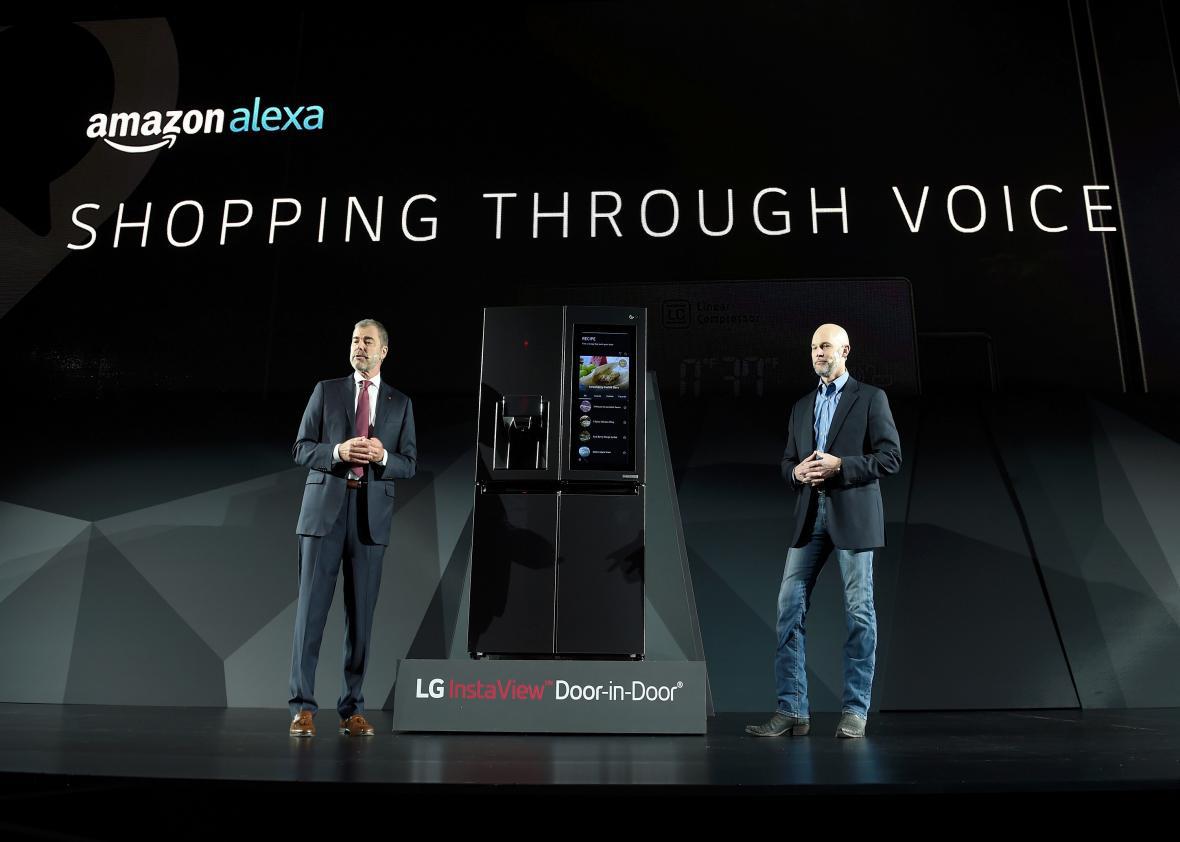It was only a matter of time. This year, your Amazon Alexa experience will cease to be ad-free as the retail giant reportedly works to secure advertising partnerships with a handful of consumer companies.
Amazon is currently in talks with Clorox, Proctor & Gamble, and others to promote their products on Alexa, the company’s virtual assistant, according to a CNBC report. Amazon is reportedly testing out various ad types, including videos and promoted paid search results (a la Google). CNBC reports that Amazon is preparing for a “serious run at the ad market” that could begin as soon as this year. (Update, Jan. 3, 2017: In an emailed statement Wednesday, an Amazon spokesperson said that the company has “no plans to add advertising to Alexa.”)
As Wired noted in December, some brands already have a presence on Amazon’s Alexa platform through their own third-party apps, called skills. You can order a Starbucks frappuccino, a Domino’s pizza, or an Uber, for example. But while you might see some of these highlighted in Amazon’s Alexa app, they’re just skills—not ads. Up until now, true advertisements on Alexa have been extremely rare. You can listen to streaming music providers that include between-song advertisements, and you may also hear an ad or two if you get daily flash briefings. Otherwise, Amazon’s policy sagely bans ads in third-party skills. As a burgeoning platform, if customers had been bombarded with ads from the get-go, it’s unlikely that Amazon would have seen the tremendous success that it has. Now that it’s already in roughly 15 million homes, Amazon can slowly start tinkering with how to make more money off its captive, indoctrinated audience.
Amazon’s ads likely won’t blare out like TV or radio commercials. Instead they’ll be more subtle and better targeted. If you use your Amazon Echo to re-order Clorox brand cleaner, for instance, Alexa could suggest you tack on another Clorox product to your purchase, confirmed with a simple yes or no voice confirmation. If you look for instructions on how to cook a recipe or how to remove a stain from fabric, Alexa could similarly offer suggestions for products you may find helpful. In some cases, Amazon will use your past shopping history to inform what types of ads and products to suggest. Currently, ads on the platform must use a completely different voice and tone than Alexa’s own speaking voice, so you can clearly differentiate what’s an ad versus what’s an Alexa response. It’s unclear whether promoted products and advertisements going forward will continue to follow that example—making it patently clear that an ad is an ad—or whether Alexa herself will suggest products you should buy, blurring the lines between legitimate search result and promoted results. Either way, if done correctly, Amazon’s Alexa-integrated ads could actually add meaningful products to our digital shopping carts—and eat up more of our hard-earned dollars.
However, Amazon has to be careful with how and when it implements advertising or sponsored content. Do it too often and Echo device owners will find the intrusion off putting. If suggested ads or promoted search results are too off-base, users will get frustrated and stop using those features. Just glancing through Amazon’s suggested purchases on my own account, the suggestions are more often ignorable than not; then again, from Amazon’s reported talks, it seems like the company will at least initially focus ad partnerships around household products and people who frequently purchase those items through its site—a narrower and more predictable target than someone who uses Amazon only for sporadic purchases. Still, it will be a delicate balance to strike, since these audio advertisements may be more intrusive than your typical on-screen ad. Amazon could also have to deal with the blowback from ads that feel too accurate, amidst growing concerns that tech giants are constantly monitoring our behavior and listening in on our conversations.
In a way, by integrating ads directly into the Alexa platform, Amazon will be in uncharted territory. While developers can include ads in their apps, or even promote their products in their respective app stores, mobile platforms iOS and Android do not integrate ads directly into their OS experiences. Neither do their respective virtual assistants, Siri and Google Assistant. In fact, Apple has even taken steps to reduce ad tracking on its mobile web browser, implemented as a means to help protect user privacy. Alexa, unlike these platforms, is a voice-first experience—by some measure, a completely different paradigm. And Amazon itself is built around being a retailer: All of its offerings, in some way, entice you to stay within the Amazon ecosystem and buy more products. While this kind of advertising would seem completely out of place in a Siri search query, with Amazon and Alexa, it was really just an inevitability.
Whether other virtual assistants will eventually follow suit is an interesting question—perhaps remaining ad-free will become a selling point of Google Home products and Apple’s upcoming HomePod. Given Google’s profitable and expansive ad and search platform, it seems more likely that it would follow Amazon’s example here, however, especially as our interactions move more toward voice. Amazon could otherwise eventually threaten to eat into Google’s search and ad dominance. Regardless, virtual assistants like Alexa are learning a lot about you and your home habits—and that’s valuable information, too, whether or not you’re being served up ads directly.
The headline of this article have been updated to reflect Amazon’s statement that it has no plans to add advertising to Alexa.
